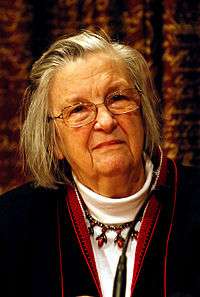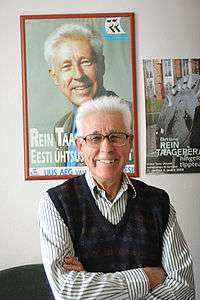Johan Skytte Prize in Political Science
| Johan Skytte Prize in Political Science | |
|---|---|
 | |
| Awarded for | most valuable contribution to Political Science. |
| Country | Sweden |
| Presented by | Johan Skytte Foundation at Uppsala University |
| First awarded | 1995 |
| Website | http://www.skytteprize.com |
The Johan Skytte Prize in Political Science (Swedish: Skytteanska priset) was established in 1995 by the Johan Skytte Foundation at Uppsala University. The foundation itself goes back to the donation in 1622 from Johan Skytte (1577-1645), politician and chancellor of the university, which established the Skyttean professorship of Eloquence and Government. The prize, 500,000 Swedish kronor (approximately $70,000) is to be given "to the scholar who in the view of the Foundation has made the most valuable contribution to political science". Since its creation in 1995, the Johan Skytte Prize has garnered a prestigious reputation within the social science community, earning the moniker "the Nobel Prize for Political Science."[1][2]
Recipients of the Johan Skytte Prize in Political Science
| Year | Recpient | Country | Rationale | Affiliation | |
|---|---|---|---|---|---|
| 1995 |  |
Robert Alan Dahl
(1915-2014) |
"for his penetrating analysis of democratic theory, characterized by deep learning and breadth of mind, combined with epochal empirical studies of the actual functioning of representative government".[3] | Professor emeritus, Yale University | |
| 1996 | Juan José Linz
(1926-2013) |
"for his global investigation of the fragility of democracy in the face of the authoritarian threat, characterized by methodological versatility and historical and sociological breadth".[3] | Professor. | ||
| 1997 | Arend d'Angremond Lijphart
(b. 1936) |
"for his theoretically and empirically pathbreaking research on the function of consensus in democratic politics in divided as well as in homogeneous societies".[3] | Professor, University of California, San Diego | ||
| 1998 | Alexander L. George
(1920-2006) |
"for his pathbreaking analysis of statecraft, its possibilities and limits, performed with great sensitivity for the importance of judgement, reasoned argumentation and responsible leadership in foreign policy decision-making".[3] | Professor, Stanford University | ||
| 1999 |  |
Elinor Claire Ostrom
(1933-2012) |
"for her profound, empirical as well as theoretical, analysis of the nature of collective action and rational choice".[3] | Professor, Indiana University Bloomington | |
| 2000 | Fritz W. Scharpf
(b. 1935) |
"for having analysed key concepts of political science with theoretical clarity and empirical thoroughness during an era of transnational change".[3] | Professor, Max Planck Institute for the Study of Societies in Cologne | ||
| 2001 |  |
Brian Barry
(1936-2009) |
"for his profound contribution to normative political theory performed with passion as well as clarity in the grand tradition from the Enlightenment."[3] | Professor, Columbia University | |
| 2002 | Sidney Verba
(b. 1932) |
"for his penetrating empirical analysis of political participation and its significance for the functioning of democracy."[3] | Professor, Harvard University | ||
| 2003 | Hanna Fenichel Pitkin
(b. 1931) |
"for her pathbreaking theoretical work, predominantly on the problem of representation."[3] | Professor emerita, University of California, Berkeley | ||
| 2004 |  |
Jean Blondel
(b. 1929) |
"for his outstanding contribution to the professionalisation of European political science, both as a pioneering comparativist and an institution builder"[3] | Professor, European University Institute, Florence | |
| 2005 |  |
Robert Owen Keohane
(b. 1941) |
"for his significant contribution to our understanding of world politics in an era of interdependence, globalisation and terrorism."[3] | Professor, Princeton University | |
| 2006 |  |
Robert David Putnam
(b. 1941) |
"for his theory of the social capital."[3] | Professor, Harvard University | |
| 2007 |  |
Theda Skocpol
(b. 1947) |
"for her visionary analysis of the significance of the state for revolutions, welfare and poltical trust, pursued withy theoretical depth and empirical evidence."[3] | Professor, Harvard University | |
| 2008 |  |
Rein Taagepera
(b. 1933) |
"for his profound analysis of the function of electoral systems in representative democracy".[3] | Professor, University of Tartu and professor emeritus, University of California, Irvine | |
| 2009 |  |
Philippe C. Schmitter
(b. 1936) |
"for his path-breaking work on the role of corporatism in modern democracies, and for his stimulating and innovative analysis of democratization".[3] | Professorial fellow, European University Institute, Florence | |
| 2010 | Adam Przeworski
(b. 1940) |
"raising the scientific standards regarding the analysis of the relations between democracy, capitalism and economic development." | Professor, New York University | ||
| 2011 | Ronald F. Inglehart
(b. 1934) |
"for contributing innovative ideas about the relevance and roots of political culture in a global context, transcending previous mainstream apporaches of research."[4] | Professor, University of Michigan | ||
 |
Pippa Norris
(b. 1953) |
Professor, Harvard University | |||
| 2012 |  |
Carole Pateman
(b. 1940) |
"for in a thought-provoking way challenging established ideas about participation, sex and equality."[5] | Professor emeritus, University of California, Los Angeles | |
| 2013 | Robert Marshall Axelrod
(b. 1943) |
"for profoundly having changed our presumptions about the preconditions for human cooperation.”[5] | Professor, University of Michigan | ||
| 2014 | David Collier
(b. 1942) |
"for his contribution to the conceptual development and the re-thinking of qualitative methods in Political Science."[5] | Professor, University of California, Berkeley | ||
| 2015 | .jpg) |
Yoshihiro Francis Fukuyama
(b. 1952) |
“for breath-taking learnedness, clarity and courage thrown new light over the growth of modern political order.”[5] | Olivier Nomellini Senior Fellow, Freeman Spogli Institute for International Studies, Stanford University | |
| 2016 | Jon Elster (b. 1940) | “for incisive, penetrating, and unceasing drive to examine and reexamine that which explains human behavior.”[5] | Robert K. Melton Professor in Social Sciences, Columbia University | ||
| 2017 | .jpg) |
Amartya Kumar Sen
(b. 1933) |
"for his multifaceted achievement that “combines insights into human vulnerability with knowledge about the potential of democratic political power to redress and relieve this deprivation.”[5] | Thomas W. Lamont University Professor, Harvard University | |
External links
- The Johan Skytte Prize in Political Science, official website
References
- ↑ "Congratulations to Professor Amartya Sen on His Award of the the 2017 Johan Skytte Prize in Political Science!". Harvard University Department of Economics. April 26, 2017.
- ↑ Dahl, Robert; Shapiro, Ian (2015). On Democracy: Second Edition. New Haven, Connecticut: Yale University Press. pp. vii.
- 1 2 3 4 5 6 7 8 9 10 11 12 13 14 15 "The Johan Skytte Prize in Political Science". May 7, 2009. Archived from the original on May 7, 2009.
- ↑ "This year´s Johan Skytte Prize winners announced". Uppsala Universitet. April 8, 2011.
- 1 2 3 4 5 6 "The Johan Skytte Prize Past Winners Over The Years". Johan Skytte Prize. August 7, 2017.